By Rebecca Maglischo
Photos Courtesy Gospel Inc.
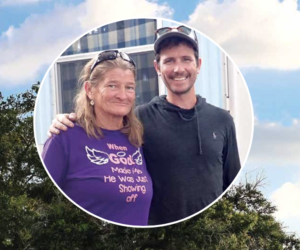 Donna Leslie furrows her brow and shakes her head at my offer to document this moment with a photo. She’s concerned it won’t be a good picture. I point out that her shirt says “When God made me, he was showing off.” She grins sheepishly, puts out her cigarette, and stands. Donna poses in front of her battered mobile home with Brian Seeley, the man who brought me here. This picture is full of irony—her shirt, his story, this street, the interplay of their shared memories. I can’t help but notice the beautiful oak tree shading these ramshackle homes and wonder what scenes it might have witnessed in this place. As a child, I spent many hours on this street, but we knew not to come down this far. Perhaps the greatest irony, though, is her unwillingness to show me inside. She doesn’t want me to see the boxes or ask questions. Donna, a woman who spent decades living homeless on the streets; a woman who, with the help of Brian and others in the community, has managed to live under this roof for more than seven years; a woman who currently represents a success story in the eyes of many is packing up to hit the streets again.
Donna Leslie furrows her brow and shakes her head at my offer to document this moment with a photo. She’s concerned it won’t be a good picture. I point out that her shirt says “When God made me, he was showing off.” She grins sheepishly, puts out her cigarette, and stands. Donna poses in front of her battered mobile home with Brian Seeley, the man who brought me here. This picture is full of irony—her shirt, his story, this street, the interplay of their shared memories. I can’t help but notice the beautiful oak tree shading these ramshackle homes and wonder what scenes it might have witnessed in this place. As a child, I spent many hours on this street, but we knew not to come down this far. Perhaps the greatest irony, though, is her unwillingness to show me inside. She doesn’t want me to see the boxes or ask questions. Donna, a woman who spent decades living homeless on the streets; a woman who, with the help of Brian and others in the community, has managed to live under this roof for more than seven years; a woman who currently represents a success story in the eyes of many is packing up to hit the streets again.
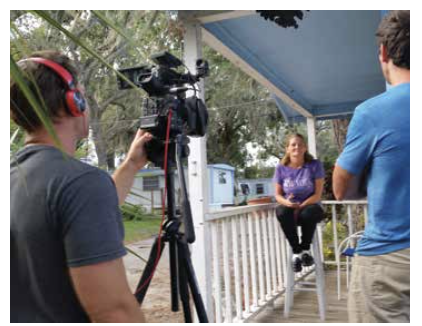
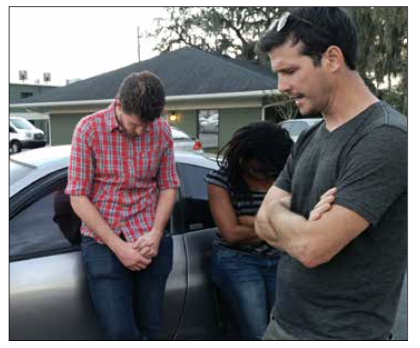
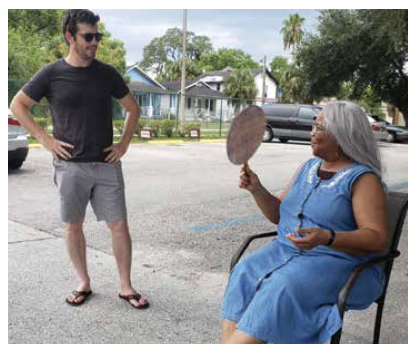
Donna Leslie and Brian Seeley met for the first time in 2010. She was 40 yrs old and homeless. Donna spent her nights in the relative safety of the bus station. She spent her days moving through Lakeland following the everchanging current of church outreach programs, labor halls, and random jobs. Brian was barely in his twenties and finishing his last year of undergraduate studies at Southeastern University. He spent most of his free time in the areas where the homeless tended to congregate. Donna giggles and pulls out a battered print from a small photo album to show me young Brian. “He walked right up to me and asked me to tell him my story. I told him that I would tell, if he would tell.” Likely, neither Donna nor Brian knew in that moment the rollercoaster they would ride together over the next decade, sometimes laughing and screeching with joy and sometimes holding on for dear life.
While most young people spend the early part of their twenties trying to figure out what they are passionate about, Brian was very clear that he had a heart for the homeless and disenfranchised. A series of poor choices had left him floundering at the age of 19 yrs old, working for his dad and wanting something different. The opportunity for adventure came with an organization called Youth With A Mission (YWAM), and Brian jumped at the chance. YWAM is a discipleship training school aimed at providing “a dynamic experience where you’ll have the opportunity to strengthen your faith in God and your calling while changing the lives of people around you.” He traveled to New Zealand in a sort of Hail Mary, a hopeful last chance to find something that resonated with his soul and gave him purpose. Early in the program while attending worship, Brian had a salvation experience. “I invited Jesus into my heart and I was set on fire!” he remembers.
The next two years would be in service to the impoverished peoples of the South Pacific, selling handmade goods to create income, living in a tent, picking fruit alongside those fortunate enough to work. Walking side by side in life and standing eye to eye with others, Brian began to see that these were people, not projects. He realized that if you can learn to love people where they are, you are awarded the privilege to see the spark inside them, no matter how small. A love like this is a love to which we can all aspire, an enemy-loving love, a love that reflects the person of Jesus and embraces the inevitable suffering that comes with the sacrifice of oneself.
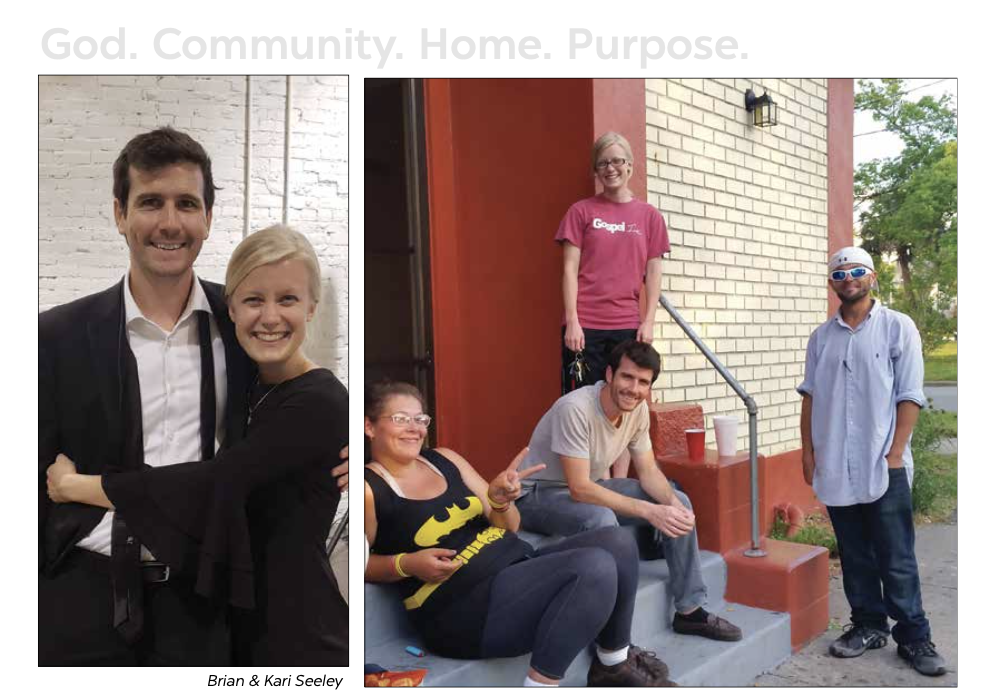
Donna was “clean” by the time she and Brian met in 2010. Her life had been deeply scarred by abusive relationships and little opportunity. She was introduced to cocaine in the 90s and ultimately lost her daughter to the system, a final slight from life that pushed her over the edge. As she tells it, a police officer said, “I’m not arresting you; I’m saving your life,” and while in jail, she missed the opportunity to see her father before he passed. She made a vow that day. She was done with drugs and miraculously remained clean even while continuing to live on the streets. Donna was shocked when Brian told her of his idea to go live in an area of Lakeland known as “the Chinese jungle.” This would serve as his internship, a requirement to complete his bachelor’s degree at Southeastern. She made the decision to go, too. It was this period of time that solidified in Brian the need for something beyond a service-level love. As he and Donna and a friend named Jordan, moved through the days and struggled in the chaos of homelessness, his vision for that idea began to take shape.
In 2011, Brian started a 501c3 called Gospel, Inc. While most of the college students moved on, Kari (who would later become Brian’s wife) and a few others remained to build the non-profit. The model looked to the person of Jesus and His character as a guide. It was a model of incarnation, a desire to step inside the world of those they served and ask “How can I serve you?” Traditional interventions have a tendency to stand on the outside and tell the individual what they need, what’s best for them. The homeless situation can feel hopeless if the end goal is the achievement of a standard. But if the end goal is simply to love them well, the burden of expectation is lifted. In this understanding of service, you can relate to the person as an individual with struggles and strengths, whims and weaknesses. You can meet them where they are and walk beside them as a friend.
When they left “the jungle” in the fall of 2010, Donna Leslie moved in with some friends of Brian’s. Over the next few years, Brian, Kari, Gospel Inc, and others in the community supported Donna’s housing until she was able to move into her current home and piece together rent with odd jobs. When she came up short, staff helped her find work to cover the difference. On the day I visited, Donna was lonely. She tells me about her one friend that has moved away. She has no car, and she says she wants to work. Finding work has been hard in the labor halls since she has aged out of manual labor, and she doesn’t have the skill set for computer work. She doesn’t like asking for money and she really doesn’t like for her cat to be hungry. Brian reassures her and gently tells her that moving back to the streets isn’t a solution. He offers suggestions, but her mind seems made up.
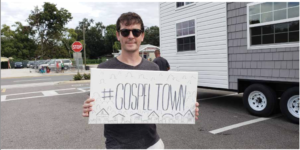 This type of life-giving service doesn’t exist without ups and downs, and Brian constantly dreamed of doing it better. Gospel, Inc began to garner community interest and to raise funds for something bigger, throwing their first real fundraiser in 2017. He wanted to serve the chronically homeless of Lakeland by giving them what they needed most—God. Community. Home. Purpose. They say “it takes a village,” and Gospel, Inc intended to build it. By 2019, the pitch for Gospel Village was real. The village would provide permanent supportive housing for individuals in a community setting with staff in place to provide care and guidance. Donors embraced the idea and gave generously. With additional funding from grants, the initial purchase of property was made and renovations began. In 2021, the first residents of Gospel Village came home.
This type of life-giving service doesn’t exist without ups and downs, and Brian constantly dreamed of doing it better. Gospel, Inc began to garner community interest and to raise funds for something bigger, throwing their first real fundraiser in 2017. He wanted to serve the chronically homeless of Lakeland by giving them what they needed most—God. Community. Home. Purpose. They say “it takes a village,” and Gospel, Inc intended to build it. By 2019, the pitch for Gospel Village was real. The village would provide permanent supportive housing for individuals in a community setting with staff in place to provide care and guidance. Donors embraced the idea and gave generously. With additional funding from grants, the initial purchase of property was made and renovations began. In 2021, the first residents of Gospel Village came home.
Fyodor Dostoevsky wrote in The Brothers Karamazov, “There is only one way to salvation, and that is to make yourself responsible for all men’s sins. As soon as you make yourself responsible in all sincerity for everything and for everyone, you will see at once that this is really so, and that you are in fact to blame for everyone and for all things.” Brian Seeley tells me this line is at the center of his passion for the homeless.
Perhaps we are all just a few bad decisions from the worst version of ourselves. Perhaps it is simple faith that can break through the corrosive acids of despair, selfish passion, and hopelessness. Perhaps, the light inside one person can indeed ignite the flame inside others. And maybe, just maybe with the support of a village, that fire can burn and the warmth of hope can begin to be restored.
Gospel Village
Takes on Homelessness in Lakeland
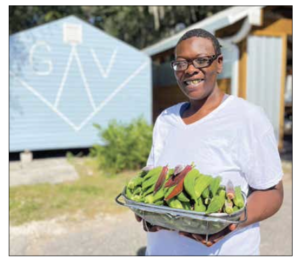 Gospel Village sits on a zig-zagged four acres encompassing addresses on East Main Street and East Lemon Street in Lakeland, FL. Thirty one units house 44 residents in a mix of mobile homes and apartments. The grounds, maintained by the residents, are landscaped with obvious care, and the buildings are undeniably inviting and quaint.
Gospel Village sits on a zig-zagged four acres encompassing addresses on East Main Street and East Lemon Street in Lakeland, FL. Thirty one units house 44 residents in a mix of mobile homes and apartments. The grounds, maintained by the residents, are landscaped with obvious care, and the buildings are undeniably inviting and quaint.
Gospel Village provides permanent housing and support of basic needs for the individuals that call this place home.
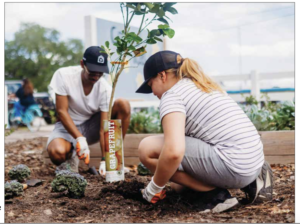
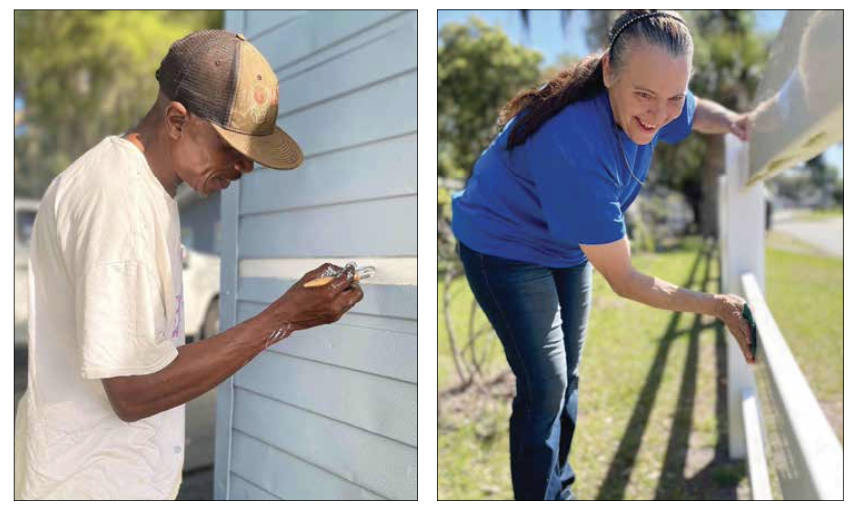
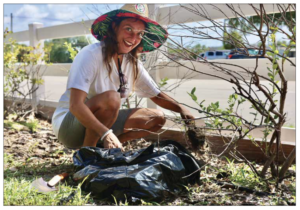
The Homeless Coalition of Polk County reports that about 600 people are currently counted as homeless. While the average citizen may only notice those sleeping on a park bench or standing at red lights with a sign, the issue of homelessness grows when you include those who have lost housing but are currently living with other family and friends; this includes a reported 3,583 students enrolled in Polk County Schools. Several shelters in the county support a variety of populations, but Gospel Village hangs their heart on those referred to as chronically homeless.
Nearly half of the individuals experiencing homelessness suffer from some sort of mental illness, and a third of those exhibit symptoms of more serious conditions. Often, these disabling struggles prevent regular employment and keep them tangled in a vicious rollercoaster of ups and downs. Drug use and noncompliance with medications further prevent success. Gospel Inc takes a unique approach that encompasses core values that draw the residents into community, providing a place of permanence and dignified work while inviting them into a relationship with God. It’s a “come as you are and stay forever” invitation. In 2024, this invitation will be open to an additional 48 residents with the completion of two more 24 unit buildings on site!
Ray Steadman, a past Lakeland resident, returned in August 2023 to accept the role of Executive Director. Gospel, Inc has 9 employees, 8 Board Members, countless contributors and volunteers, and integral relationships with the many programs throughout Polk County that can offer specific aid to residents. “We can’t do everything,” Ray points out. “Lakeland and the broader Polk County have rallied around us. Our ability to refer out allows us to focus on what we do best here.” And they do a lot!
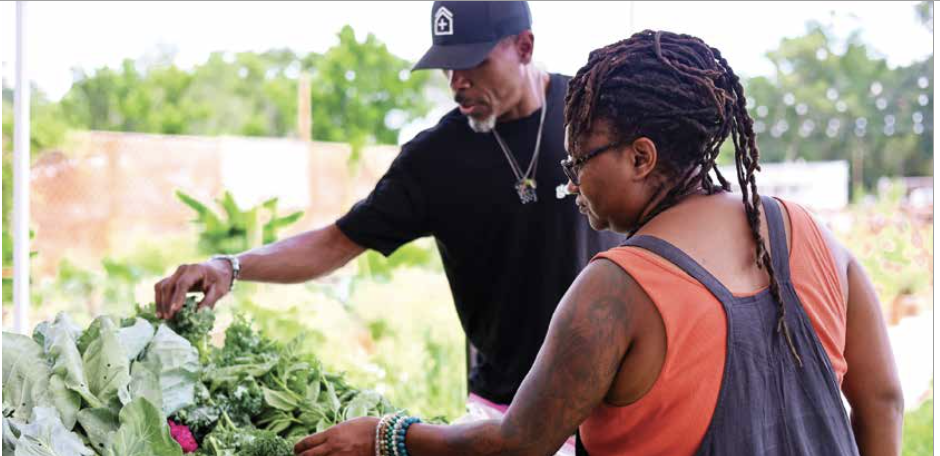
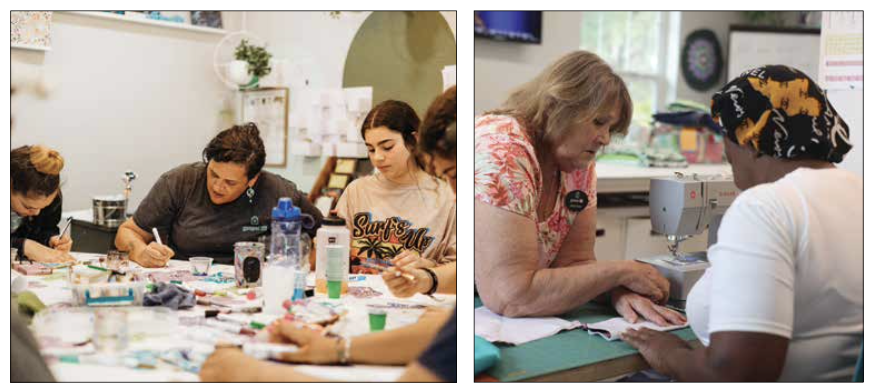
The village has a community fridge and pantry, a micro-farm, and a laundry area. When a resident moves in, the whole community throws a welcome home party, complete with a “reveal” of their new home.
The RePurpose Art Studio is staffed by community volunteers that teach sewing and art classes to residents and others struggling with homelessness. It’s a creative outlet and an opportunity for enterprise. Every item is labeled with the creator’s name and displayed for sale at events and markets. These proceeds go back to the individual. The staff here love the residents deeply, and it shows as they help them through struggles big and small.
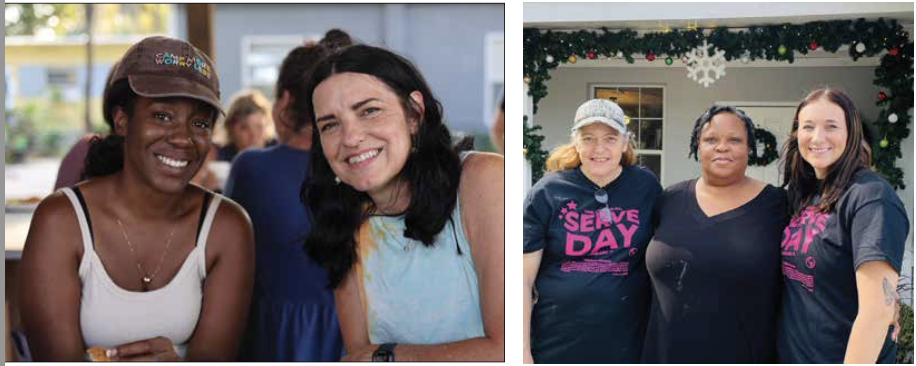
The Pavilion is quite possibly the physical heart of Gospel Village. On the surface, it is an outdoor kitchen with picnic tables, beautiful lighting, and a welcoming vibe. But this is where magic happens. Every Thursday a community dinner is hosted in this common area. Music, games, delicious smells, smiles and laughter… it’s all here. It’s a weekly opportunity to restore faith and know, beyond a shadow of a doubt, that this place is safe; this place is home. The viability of faith is confirmed in lived reality. It’s how we respond to guilt or shame, and how we experience grace and mercy.
The Pavilion is the birthplace of faith in the goodness of community and the undeniable glory of God’s love. In the end, this is what it’s all about. God. Community. Home. Purpose.
Gospel, Inc
(863) 940-4069
info@gospelinc.org
1111 East Main St
Lakeland, FL 33801



